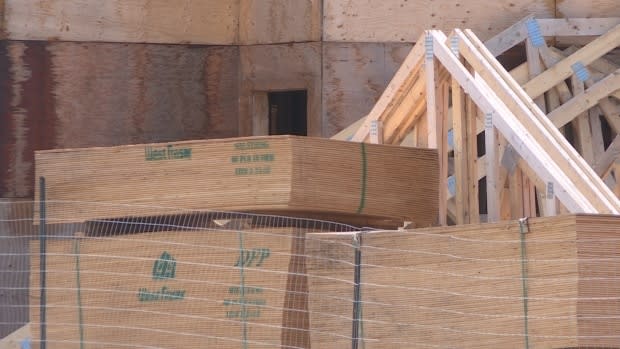Charlottetown seeing strong residential construction season
More housing options for people living in Charlottetown are coming on the market, as new builds wrap up or get underway.
According to the Canada Mortgage and Housing Corporation, in the second quarter of this year 138 projects were completed in Charlottetown. One hundred of those were apartment units, and the remainder were single homes, townhouses or semi-detached homes.
In Q2 of 2019, only 22 housing projects were completed, and none were apartments.
"There was a bunch of big projects that were started two years ago that are now completed," said Charlottetown Councillor Greg Rivard, chair of planning and heritage.
"They will factor into the vacancy rate, but the ones that you see started now, they won't factor in until potentially next year or the year after."
The number of construction starts is also up compared to this time last year. In the second quarter of 2020, 240 housing projects were started, with 210 of them being apartment units. Last year only 67 were started, 20 of them apartments.
For Rivard, all of these new and completed builds means things are moving in the right direction.

"Any builds are good builds, in that sense when you're trying to increase the vacancy rate and provide housing for all," he said.
How these new units will affect the vacancy rate in the city is yet to be seen, Rivard said. CMHC will not look at that until the end of the year.
Affordability questioned
The P.E.I. Fight for Affordable Housing group agrees that new builds are good, but it is concerned about what the rental cost will be.
Ainsley Kendrick, a member of the group, said the ads she sees for these new builds are highlighting amenities, but they often lack a price tag.
"You can build a bunch of apartments, but if people can't move in them and afford them then what's the purpose?" she said.
"Who are they being built for is the question that we really need to ask."
Kendrick said she would like to see affordable units built into any new apartment projects.
"It is so important that both levels of government consider inclusionary zoning in their laws now, or in their bylaws," said Kendrick.
"If any new builds happen a certain percentage, we would say 30 per cent, of those units should be affordable."

The group would like to see the cost for affordable units set at approximately 25 per cent of a minimum wage income.
Currently, both the province and the City of Charlottetown use an incentive-based program to encourage developers to build affordable housing.
The province's Affordable Housing Development Program provides a forgivable loan to developers based on how many affordable units they build. New builds, current builds or renovations to existing builds are eligible.
In 2019, the City of Charlottetown launched an affordable housing incentive program. It introduced new rules to allow developers to increase density and waived permits for new affordable housing projects.

Rivard said by increasing housing stock, it's inevitable that rent will fall, as landlords will have to compete more for tenants.
"You increase your housing stock, you increase your vacancy rate, you know landlords are at a point that they have to compete and they have to offer competitive rates and rental rents. So that's key,' he said.
More from CBC P.E.I.


